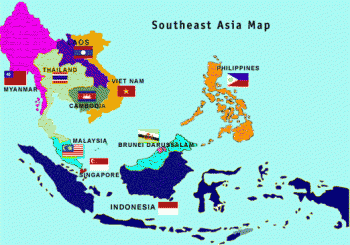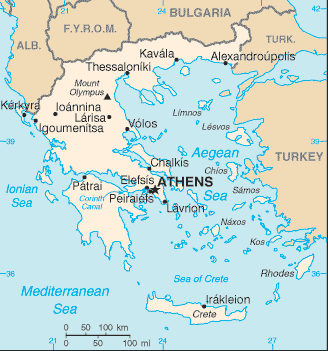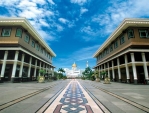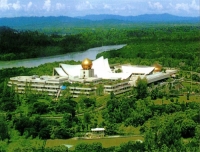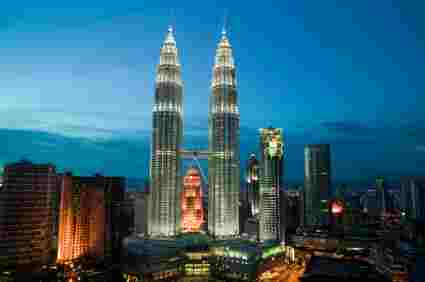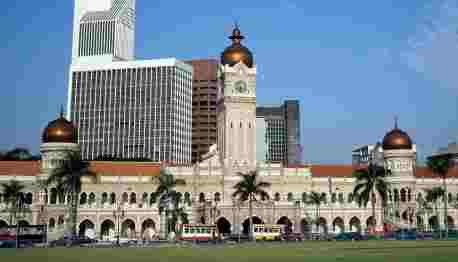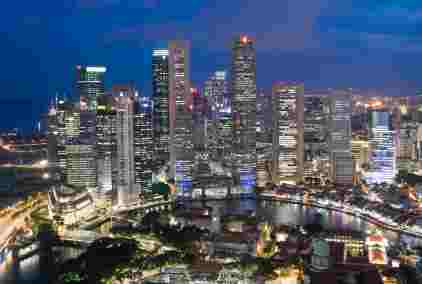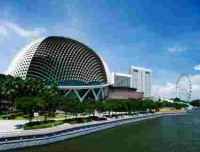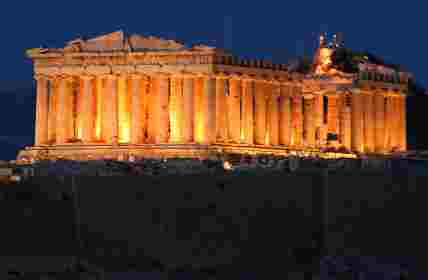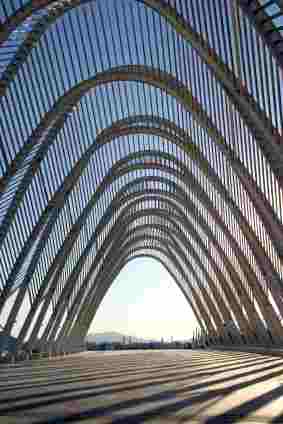|
InterResearch operates in selective markets (Southeast Asia, and Greece), through its bases in the UK and Malaysia, serving European and North American clients.
InterResearch has a strong belief in the growth potential of the markets of Southeast Asia, especially for Small- and Medium-sized companies, despite the competition coming from China and India, where foreign Small- and Medium-sized companies are finding it difficult to operate, and are at a disadvantage.
Southeast Asia has seen tremendous rates of growth over the last 2 decades, growth that has substantially superseded that of Europe and North America. The growth has been supported by abundant natural resources (oil, gas, minerals), business policies that support the development of private-sector business entities, low taxation, and liberal labour practices.
The 10 counties of Southeast Asia are members of ASEAN, the Association of Southeast Asian Nations, a grouping of 580 million people. The Jakarta-based organization is aiming to move closer to a European Union-style community, with harmonisation of objectives and policies. ASEAN has concluded Free Trade Agreements (FTAs) with Australia China, India, Japan, Korea, and New Zealand, and is currently negotiating an FTA with the European Union. Significantly, also countries have signed individual FTAs with their main trading partners, such as the FTAs signed between Singapore and the US, and between Malaysia and Pakistan.
Source: Asean Secretariat www.aseansec.org
Greece is a unique market that doesn’t get appreciated, and is often misjudged. Despite its bureaucratic reputation, and reality too (!), Greece produced for the most part of this decade amongst the highest growth rates (of around 4%) in the European Economic Union. Notably, Greece is a market where Multi-National Corporations (such as banks and retailers) enjoy amongst the highest returns of their foreign operations.
The country organised and hosted very successfully the 2004 summer Olympic Games, which were the first such event after September 2001, and where Security was the main issue. Significantly, Greece is amongst the smallest countries ever to organise the Games, and definitely the smallest in more than 50 years. As such, Greece was preceded as a host country by Australia and the US, and was followed by China, countries and economies of immense size compared to Greece. Furthermore, during the present decade, national Greek sports teams and athletes have achieved tremendous success on a global and European level, which again is not commensurate with the size of the country and its population.
Greek companies, and especially those from Northern Greece, benefitted by the opening of the neighbouring countries’ markets, such as Romania, Bulgaria and Albania, where they expanded their sales territories and also established manufacturing facilities in order to take advantage of lower labour costs.
However, the global financial crisis of 2008/2009 has exacerbated the structural weaknesses of the Greek economy, and the country is facing a fiscal crisis.
Comparative Data
The table below places the selected 4 countries amongst most of the rest of the world in terms of some interesting comparisons.
The excellent data of Singapore is noted, as is the weakness of the data of Greece.
Comparative Rankings and Amounts
Source: (a) World Economic Forum (b) IMF (c) Transparency International
Below are brief profiles of the key markets, from the InterResearch point-of-view:
BRUNEI:
An Islamic Monarchy of 400,000 people, and a 2008 (est) GDP of US$14 billion, Brunei has gained worldwide name recognition due to the ranking of its Sultan as the world’s richest man in the 1980s and 1990s. The country’s wealth is based in its extensive deposits of Oil & Gas, which are exported mainly to Japan and South Korea.
The population is enjoying a lifestyle that is tax-free, and with heavily subsidized benefits (such as electricity, fuel and foodstuffs like rice). Over the last 2-3 years a strong retail market has developed, with significant growth in the number and sizes of shopping centers and supermarkets.
The government is trying to diversify the economy, and develop other sectors such as Tourism (through eco-tourism), the Trans-shipment of Goods, the Halal Foods industry (the Brunei Halal brand), and the Processing of Petrochemical Products (such as Methanol).
The government is also increasing the involvement of Brunei in global affairs, such as peace-keeping missions, while maintaining the financing of various charitable causes.
The Brunei Dollar is pegged on a 1-to-1 basis to the Singapore Dollar.
MALAYSIA:
A constitutional Monarchy of 26 million people, and a 2008 (est) GDP of US$222 billion, Malaysia is a country that is divided into 2 geographical areas: Peninsular Malaysia (which is the extension of Indochina towards the Equator), and Eastern Malaysia (the northern part of the Borneo island, which is shared with Indonesia and Brunei).
Malaysia has seen its name recognition, and position in world affairs, enhanced significantly over the last 2 decades, by the use of politics and mega-development projects (such as the Petronas Twin Towers, Sepang Formula 1 circuit, Smart tunnel, and Iskandar Development Region). Malaysia sees itself as a leader of Emerging countries, and in the Islamic World, and has assumed a role as the vocal representative of both to the world.
The country has very substantial natural resources (such as Oil & Gas, minerals, and timber), which have financed a high standard of infrastructure (roads, airport). Malaysia’s vibrant economy has evolved from the export of raw materials into Manufacturing (automotive, chemicals, electronics) Services and Tourism, with office buildings, shopping centers and hotels of world-standard. International franchise retailers and restaurants are found everywhere.
Malaysia has been amongst the biggest exporters of high-tech equipment (such as semiconductors). The government is strongly supporting the promising industry sectors of Bio-technology and Bio-fuels.
The theme of Malaysia’s tourism campaign is “Truly Asia” which reflects the composition of its multicultural population of Malay (Muslims), Chinese (Buddhist, Christian), Indians (Hindu, Christians) and Indigenous Tribes.
SINGAPORE:
A parliamentary Republic of just under 5 million people, and a 2008 (est) GDP of US$182 billion, Singapore is a 1st World country that has been the envy of many. Starting from almost nothing, this island country has become a global player in Finance, Trade, Business Services, Tourism, Processing of Fuels, and Manufacturing – all these from a country that is importing its water, and is constantly reclaiming land from the sea.
The government has had complete control of the economy and society, and Singapore has had a reputation of a structured but also strict country (where fines are issued freely for simple misguided activities). However, more recently there is a sentiment of change and liberalisation, with the government giving a strong push to the Creative (arts, media), Finance (asset management, private banking), Tourism (integrated resorts, gaming, night-time Formula 1 racing, medical), and Bio-technology industries.
Singapore has some of the world’s “bests”. Orchard Road is one of the world’s best-known retail addresses, with new shopping centers coming up annually. Singapore Airlines is one of the world’s premier airlines, and the first to fly the A380. The Port of Singapore, one of the world’s busiest, has 147 cranes and 70 container and multi-purpose berths. The Singapore Flyer is the world’s tallest Ferris/observation wheel at 165 meters, 30 meters higher than the London Eye.
Singapore has big plans to increase its population by attracting large numbers of expatriate professionals, and to increase its land base by further reclamation. Opportunities for quality consumer products, technologies, and services are abundant.
GREECE:
A parliamentary Republic of 11 million people, and a 2008 (est) GDP of US$357 billion, Greece has a history that goes back thousands of years. Greece is in the southeastern part of Europe, it has the largest economy in the region, and is amongst the largest investors in the economies of its neighbours. Greece is the oldest member of NATO and the European Union in the region. Greece is a large recipient of funds from the European Union, through the Community Support Framework programs.
The Greek economy is based on Agricultural Products (some of which have worldwide recognition, such as Kalamata Olives, Extra Virgin Olive Oil, and Feta Cheese), Tourism (the so-called “Heavy Industry” of Greece, known around the world for its antiquities, islands, and beaches), Manufactured Products, Real Estate Development, Finance, and Shipping (Greek ship-owners control the largest percentage of the world’s shipping fleet, and they contribute billions of US$ to the economy). More recently, shopping centers are being built around the major cities in Greece, which have also seen a substantial increase in the number of foreign-owned DIY stores and discount supermarkets.
There is a growing number of small high-tech companies being developed, some of which have attained world market leadership (such as in Mobile Marketing).
Processed Agricultural Products and Technology-based Products are the most promising export sectors. Golf Courses and Integrated Resorts are growing sectors in the Tourism industry.
|
